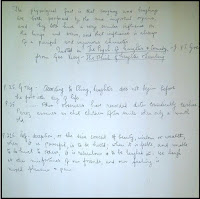I love hanging out with my daughter Rebecca.
She’s smart, funny, and most of all, curious. Her curiosity defines her
work in ecology and evolutionary biology, and it even leads her into paying
attention to her father at times.
Last week, walking around the UofT campus, we merged the subjects of
“curiosity” and paternal wisdom in a discussion of what some call “curiosity
driven research.”
“So, I get it, but how do you convince other people that we should spend
money on this stuff?” the older of the two said.
 She had a bag full of answers to draw on. Researchers with the will to debate the
issue can easily recite life-improving discoveries and innovations that have
flowed our way because some smart person was trying to understand the world
better. These discoveries share one
common characteristic; they were not the thing the researcher was trying to
find and did not immediately express practical application.
She had a bag full of answers to draw on. Researchers with the will to debate the
issue can easily recite life-improving discoveries and innovations that have
flowed our way because some smart person was trying to understand the world
better. These discoveries share one
common characteristic; they were not the thing the researcher was trying to
find and did not immediately express practical application.
Making the connection between unintended results and unrelated intent
can be a hard sell, and it makes it easy for uninformed critics to believe what they want - and for a
father to tease his scientist daughter.
But as I began to pursue the point, we passed by the Thomas Fisher Rare
Book Library on St. George, and I was distracted.
“Hey, I always wanted to visit that place,” I said. “Do you mind if we go in for a second ?”
I knew the Fisher Library to be the repository of correspondence from
and to Leacock Medalist and poet Earle Birney.
It always amused me that McClelland & Stewart, the publisher of
Birney’s novel Turvey, felt it
appropriate to delete all of the swear words from a satire on war. I thought it would be even more amusing if I
could find correspondence around this decision.
It was meant as a short detour on the way to Becky’s lab, but the staff
at the
Fisher were so accommodating and made it so easy, I soon found myself a registered researcher and booked to review documents in the Reading Room later in the afternoon.
Fisher were so accommodating and made it so easy, I soon found myself a registered researcher and booked to review documents in the Reading Room later in the afternoon.
 We continued on our way to the ecology labs, met more young researchers,
and heard more stories of science aimed at answering questions that seemed far
from my daily concerns, but were clearly the most important issues in the world
to those trying to solve them. The
evolution of vision, whether smaller plant roots can actually be stronger, and
what really constitutes an “invasive” species.
I realized then that the way to make a compelling argument for basic
research was to make it to those who matter - the young people who need to stay
curious, enthused, and driven - not those who don’t want to be convinced.
We continued on our way to the ecology labs, met more young researchers,
and heard more stories of science aimed at answering questions that seemed far
from my daily concerns, but were clearly the most important issues in the world
to those trying to solve them. The
evolution of vision, whether smaller plant roots can actually be stronger, and
what really constitutes an “invasive” species.
I realized then that the way to make a compelling argument for basic
research was to make it to those who matter - the young people who need to stay
curious, enthused, and driven - not those who don’t want to be convinced.
It doesn't matter how much money you throw at research of any kind if
the scientists, engineers, and technicians are not curious and enthused about
what they are doing. There won't be
results of any kind without these forces – and, in any case, the enthusiasm and
curiosity of those directly involved make the best advertising for the worth of
any enterprise.
So, I satisfied myself with copies of other tidbits: a Turvey rejection letter from Putnam and Sons, a doodle drawing from the cover of Don Harron’s Turvey radio script, and notes that Birney made for his UBC Creative Writing class. These latter scribbles dealt specifically with the issue of humour in writing and revealed some of Birney's personal beliefs.
So, I satisfied myself with copies of other tidbits: a Turvey rejection letter from Putnam and Sons, a doodle drawing from the cover of Don Harron’s Turvey radio script, and notes that Birney made for his UBC Creative Writing class. These latter scribbles dealt specifically with the issue of humour in writing and revealed some of Birney's personal beliefs.

At the registration desk, I explained my interest in Birney and Turvey by pulling out a copy of my book on the Leacock Medal winners. The librarian said he was surprised that such a work was not in their collection, and this led me to make a donation of my book on the spot, signing it, and transferring it as an “Author’s Presentation” copy for placement in the UofT's Thomas Fisher Rare Book Library.
My daughter was impressed and that made my day - though it did come at a humbling price.
“See Dad, you never know what will happen if you follow your curiosity.”




